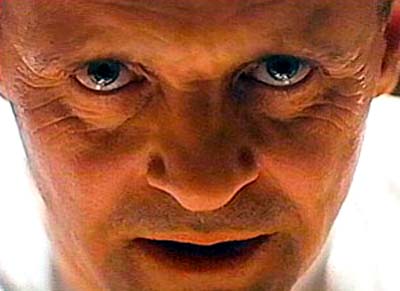One central reason The Silence of the Lambs is so compelling is the extent by which it is unified in plot. The obvious one is the recurring "lamb" motif -- when Starling was young, she had to live at a lamb slaughter house, whose screams haunted Starling for years. As the tension increases and the movie gets closer to the climax, I got a sense that Starling was trying to make amends for these horrors; to try and make right a terrible wrong, in her mind. This was reinforced as Lector asks "Will the lambs be silent, then?" in reference to the event that Starling should save Catherine Martin, who was captured by Buffalo Bill. Starling embodies this mindset as her desperation increases to save Catherine -- and then, she does in a climatic series of events. Meanwhile, Lector escapes to the streets in a complex plot twist. He calls Starling after everything has settled down, and asks her: "Have the lambs gone silent, Clarice?" Then once again, the audience is left pondering the internal struggle Starling has gone through, and whether she will be at peace with Lector -- whom she respects and loathes -- on the loose once again.
Another aspect that makes this movie so compelling is its implantation of several types of irony, which gives the film a sense of mystery along with unique moods. First, Hannibal Lector uses verbal irony quite a bit. That is, he says things that he means in an entirely different way. For example, he uses anagrams to give one name to Starling and his captors, and yet hides what he really means underneath it. Probably the most interesting aspect of Lector is his complete irony of character. While he is an intellectual beyond anyone he has ever met, a doctor in psychiatry, he embodies the urge for primal cannibalism. This juxtaposition of complete opposite mindsets creates a mystery around Lector; the audience wants to know why he is the way he is. Lastly, Demme constructs irony of tone to highlight this part of Lector. After he escapes the cage by brutally beating both guards, and pepper spraying and eating another man's face, he listens to calm, sophisticated classical music. The audience is left with a bizarre feeling: should I feel repulsed or relaxed? Over and over again, Demme uses irony to provoke our interest in the origins of Lector's personality traits.
While it is true that The Silence of the Lambs is brutal and violent, the compelling traits of Buffalo Bill, Clarice Starling, and Hannibal Lector would not be able to be revealed as effectively without it. Demme recognizes that often the most dramatic, heart-felt truths are only drawn out with such primal aspects as cannibalism and death. I, on my part, am reminded of a study done in which it was found that rapists, pedophiles, and the like score perfectly high on moral exams; yet, they are testaments to anything but morality. This part of Lector fascinates me -- obviously he has perfect understanding of morality. Yet, he doesn't care for any of it. I am left thinking of his ironic traits and his views on "the lambs" whenever I think of the movie; yet, I can't quite make sense of it. I suppose that was Demme's intention from the start.
 |
| Hannibal Lector |
No comments:
Post a Comment